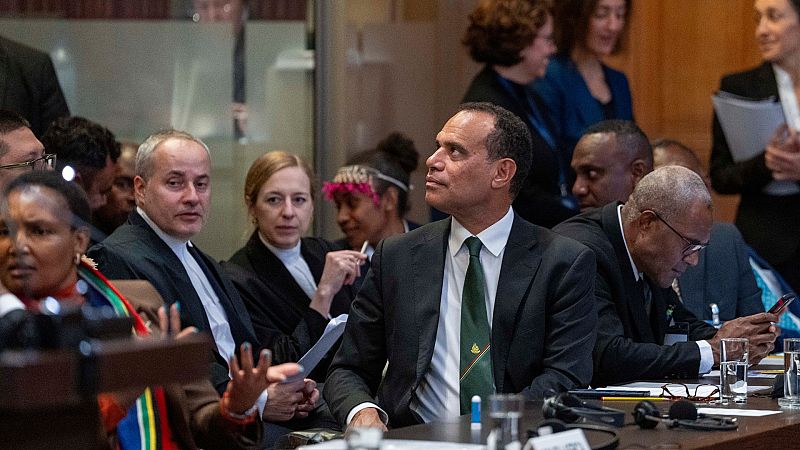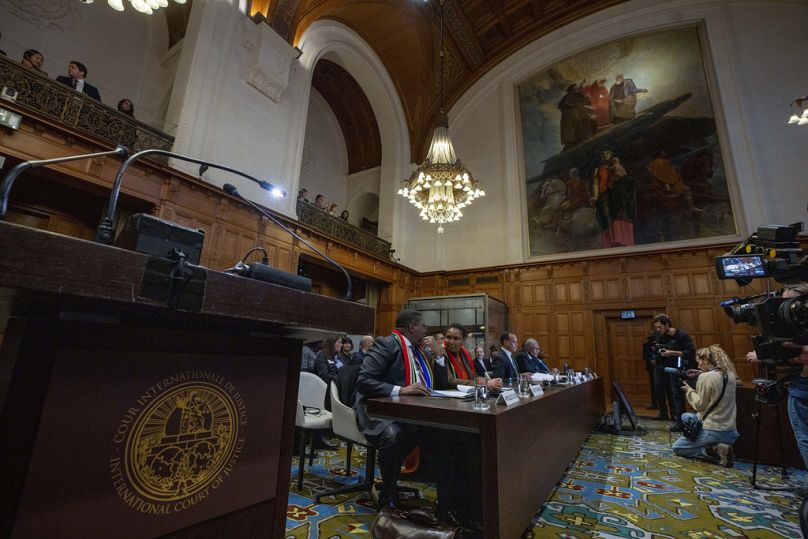Big polluters accused of hiding behind climate treaties at landmark ICJ hearings

Clear divides are emerging in what may be the International Court of Justice’s (ICJ) biggest-ever legal case.
Lawyers and representatives from more than 100 countries and organisations are due to make submissions over two weeks of proceedings on states’ legal climate change obligations.
As the hearings opened on Monday, Vanuatu - the Pacific Island state that initiated the request for an advisory opinion from the ICJ - told the court that the responsibility for the climate crisis lay with “a handful of readily identifiable states”.
Alongside other island states, it argues that there is a legal climate responsibility beyond UN treaties or frameworks like the Paris Agreement. So far, many of the world’s biggest polluters have disagreed, saying the current system is more than enough to deliver what is needed.
Do high-emitting countries have an obligation to help?
One of the first countries to address the hearings at The Hague in the Netherlands on Monday was Australia. Solicitor-general Stephen Donaghue argued that treaties like the Paris Agreement or United Nations Framework Convention on Climate Change (UNFCCC) were the “primary sources of states’ obligations under international law in respect of climate change”.
Australia’s lawyers called on judges to interpret international laws “harmoniously” with these treaties. It also added that it was “resolutely committed” to upholding the Paris Agreement but essentially said it does not believe high-emitting countries have any further legal responsibility to prevent climate catastrophe.
“Australia acknowledges the extent of the challenge posed by climate change. And recognises that ambitious individual and collective action must be undertaken urgently,” General Counsel for the Attorney General Jesse Clarke told the court at the Hague.
"In this regard, the UNFCCC and the Paris Agreement are the central instruments that provide the framework for international cooperation and commitments to tackle the grave challenge of climate change."
Representatives for the country said that the requirements of international laws had already been considered when these treaties were being negotiated.
It was a somewhat unexpected position from a country that joined Vanuatu’s petition calling for an advisory opinion from the ICJ. But it wasn’t clear until the hearings started exactly which position Australia would choose to argue from.
World’s biggest polluters want to stick to the status quo
The world’s two biggest polluters have also urged the ICJ to stick to the current process in its advisory opinion.
US State Department legal adviser Margaret Taylor said the UN climate change regime “embodies the clearest, most specific and the most current expression of states’ consent to be bound by international law in respect of climate change.”
“Any other legal obligations relating to climate change mitigation identified by the court should be interpreted consistently with the obligations states have under this treaty regime,” Taylor added, calling for the judges to ensure that its advisory opinion “preserves and promotes” the centrality of this regime.
The State Department legal advisor also dismissed any idea that the ICJ’s advisory opinion should propose that historic emitters be held accountable for past pollution.
China echoed the same sentiment as the US in its comments to the ICJ.
On Tuesday, the country’s representative Ma Xinmin said China hopes “the court will uphold the UN climate change negotiations mechanism as a primary channel for global climate governance”.
China told the court that, while it understands the “enormous difficulties” the small island state of Vanuatu faces, existing UN treaties should still “provide the basis for states’ legal obligations to fight global warming and address the consequences of their historic contributions”.
Neither of these two countries fully recognises the authority of the ICJ.
Island states say treaties can’t be a ‘veil’ for inaction
Vanuatu has hit back against some of the statements given by countries so far.
“We are obviously disappointed by the statements made by the governments of Australia, the United States, Saudi Arabia, and China during the ICJ proceedings,” says Ralph Regenvanu, Vanuatu’s Special Envoy for Climate Change and Environment.
“These nations, some of the world’s largest greenhouse gas emitters, have pointed to existing treaties and commitments that have regrettably failed to motivate substantial reductions in emissions.”
Regenvanu clarified that, while these treaties are essential, they cannot be a veil for inaction or a substitute for legal accountability.
It is particularly concerning, the special climate envoy said, that some of these nations, which developing countries rely on for aid and support, have not recognised the severity of the climate crisis or their responsibilities under international law.
“Our dependence on their assistance makes it all the more critical for them to act responsibly and in solidarity with vulnerable nations like ours.”
Yesterday


